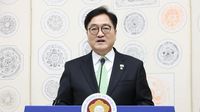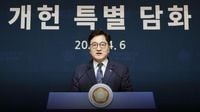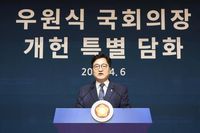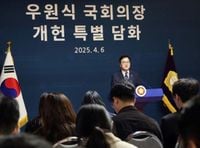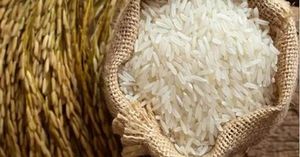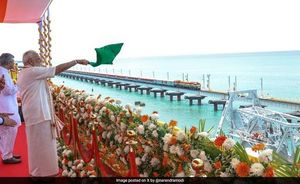On April 6, 2025, Woo Won-shik, the Speaker of the National Assembly of South Korea, held a press conference where he proposed a significant political initiative: to conduct a national referendum on constitutional amendments concurrently with the upcoming presidential election. This bold suggestion comes at a time when the need for constitutional reform has gained unprecedented public support, particularly following a period marked by political turmoil and emergency measures that have sparked widespread debate about the nation's governance structure.
During the press conference held at the National Assembly in Yeouido, Seoul, Woo emphasized that the timing was ripe for such reforms, stating, "The urgency for constitutional amendments has never been clearer, especially after the recent political crises that the country has faced." He argued that the proposed changes are essential to strengthen democratic principles and enhance national sovereignty and unity.
Woo's proposal includes amending the National Referendum Act and forming a special committee dedicated to constitutional amendments within the National Assembly. He highlighted that while many presidential candidates have historically pledged to pursue constitutional reforms, only one such initiative has successfully progressed since the establishment of the Sixth Republic in 1987. This, he pointed out, is largely due to the differing interests among political factions and the complexities surrounding power structure reforms.
"The political landscape often changes with the parties in power, and this has made it difficult to achieve consensus on necessary reforms," Woo noted. He stressed that the new president's term should not begin without addressing these critical issues, as delaying reforms could lead to further political gridlock.
Reflecting on the current political climate, Woo stated, "The people's desire is to change the winner-take-all political structure that has contributed to extreme political conflicts." He called on the National Assembly to respond responsibly to this public sentiment, suggesting that a constitutional amendment focused on national sovereignty and unity could be achieved by 2025.
In his remarks, Woo acknowledged the historical context of the proposed amendments, noting that the recent emergency measures and impeachment crises have created a sense of urgency among the populace for reform. He articulated that the need for a constitutional overhaul is not just a political necessity but a societal demand to ensure that the hardships faced by citizens can be transformed into an opportunity for significant change.
Woo also pointed out that the principles of checks and balances must be reinforced through the constitution to mitigate the risks of concentrated power. He stated, "It is crucial to distribute power effectively and institutionalize cooperation to foster national unity and sovereignty."
In terms of specific proposals, Woo mentioned that while the most challenging aspects of power structure reforms should be addressed now, any incomplete elements could be revisited in a second constitutional amendment alongside local elections scheduled for the following year.
He further urged the immediate formation of a special committee on constitutional amendments, emphasizing the need for swift action given the time constraints involved in such processes. Woo stated, "We must act quickly to ensure that the necessary discussions and agreements can be reached in a timely manner."
Additionally, he highlighted the importance of revising the National Referendum Act, particularly the provisions regarding overseas citizens' voting rights, which have previously been ruled unconstitutional. Woo argued that amending this law is critical to facilitating simultaneous voting for both the presidential election and the constitutional referendum.
"The current legal framework has not been updated since 1989, and it is essential to align it with contemporary democratic standards," he asserted, calling on all political parties to expedite discussions on these amendments.
In response to questions about the consensus on a four-year presidential term system, Woo indicated that there appears to be broad agreement among various political factions. He expressed optimism that discussions surrounding constitutional amendments are gaining traction, stating, "There has been significant dialogue among party leaders, and I believe there is a growing recognition of the need for reform."
In conclusion, Woo's proposals mark a pivotal moment in South Korean politics, as the country grapples with its democratic future. The call for a constitutional amendment referendum alongside the presidential election represents a critical opportunity for citizens to influence the governance structure directly. As political leaders navigate these discussions, the outcome could reshape the political landscape and address long-standing issues surrounding power distribution and democratic representation in South Korea.
